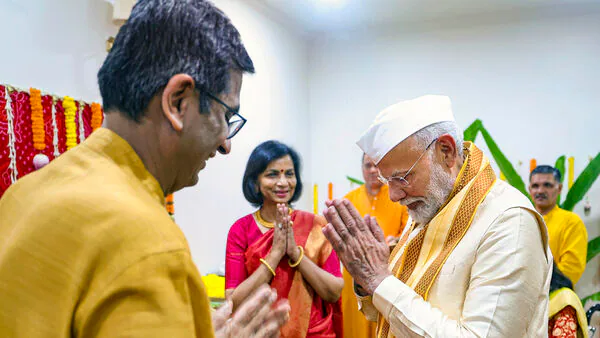On September 17, 2024, Prime Minister Narendra Modi attended a Ganesh Puja ceremony at the residence of Chief Justice of India D Y Chandrachud. The event, which aimed to celebrate the traditional Hindu festival of Ganesh Chaturthi, quickly became a focal point of controversy. Opposition parties, particularly the Congress, questioned the propriety of the Prime Minister’s visit, arguing that it blurred the lines between religious observance and political conduct.
Congress Criticism and Modi’s Response
In response to the backlash, PM Modi addressed a rally in Bhubaneswar, Odisha, where he launched the Subhadra Yojana, a scheme aimed at improving rural infrastructure. Modi criticized the Congress and its allies, accusing them of having a problem with Ganesh Utsav. He claimed that the Congress and its “ecosystem” were disturbed by his participation in the festival, reflecting a broader issue with traditional Hindu practices.
Modi’s rhetoric was sharp and historical. He drew parallels between the current criticism and the British-era “divide and rule” policy. “During the time of British rule, when they were using the divide and rule policy, Ganesh Utsav used to rattle them. Today, too, the power-hungry people looking to divide and break society are having problems with Ganesh Puja,” Modi stated. This statement underscored his belief that opposition to Ganesh Puja was a tactic employed by those who sought to undermine traditional values and practices.
Historical Context and Modern Implications
The debate surrounding Modi’s participation in Ganesh Puja taps into a deeper historical and cultural context. The Ganesh Chaturthi festival, which celebrates the Hindu god Ganesh, is a significant cultural and religious event in India. It is marked by elaborate rituals, community celebrations, and public processions. For many, it represents an essential aspect of Hindu identity and tradition.
Modi’s involvement in such a high-profile religious event as the Chief Justice’s guest highlights the complex relationship between politics and religion in India. Critics argue that such participation could blur the lines between state and religious affairs, potentially leading to perceptions of favoritism or bias. Conversely, supporters of Modi’s participation see it as a celebration of cultural heritage and a reinforcement of India’s rich traditions.
Political Fallout and Public Reactions
The controversy has sparked varied reactions across the political spectrum. Members of the Congress party have accused Modi of using religious events for political gain, suggesting that his participation was strategically timed to resonate with Hindu voters. They argue that such actions could potentially influence electoral outcomes and exacerbate communal divides.
On the other hand, Modi’s supporters view his participation in Ganesh Puja as a reaffirmation of his commitment to upholding Hindu traditions and cultural practices. They argue that the Prime Minister’s involvement in the festival is a sign of respect for India’s diverse cultural heritage and that criticisms from the opposition are politically motivated.
The debate over PM Modi’s participation in Ganesh Puja exemplifies the ongoing tensions between religion and politics in India. As the country navigates these complex issues, the controversy surrounding Modi’s involvement in the festival continues to evoke strong responses from various quarters. Whether viewed as a celebration of tradition or a contentious political maneuver, the Ganesh Puja controversy highlights the significant role that religious practices play in shaping contemporary Indian politics and society.


Leave a Reply